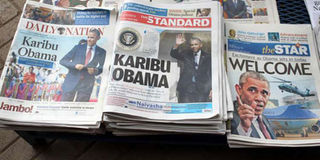Acknowledging sources is enough to avoid plagiarism accusations

Newspapers in Nairobi on July 24, 2015. PHOTO | JEFF ANGOTE | NATION MEDIA GROUP
What you need to know:
The idea is to respect the intellectual property of other people and the best ways of avoiding plagiarism in journalistic writing is to acknowledge your sources clearly when you paraphrase, as Enock Matundura did, and to quote when you use their words verbatim.
In journalistic writing, adopting the citing styles used in academia is too pedantic.
George Marenya has been on the case of Enock Matundura who wrote “Lessons from Starehe Boys on preventing school arson”, published in the Saturday Nation of August 6, 2016.
He insists that Mr Matundura plagiarised School Mastery: Straight Talk about Boarding School Management in Kenya, published in 1994 by Dr Geoffrey Griffin, the founder of Starehe Boys’ Centre. Mr Matundura, an alumnus of the school, is a prolific writer who teaches at Chuka University.
“I have read Enoch Matundura as per today SN August 6, 2016. Concerned like any right thinking Kenyan, I recently visited Starehe Boys Centre and borrowed a copy of School Mastery by Geoffrey Griffin from the director,” he said. “Matundura plagiarised Griffin from page one to three of his book. I find that rather silly coming from a Starehe alumni and a member of the academia. I blame your mealy mouthed responses to plagiarism for this. I take the unprecedented step of showing you the pages concerned.”
Although Mr Matundura did not use any quotation marks to indicate the words lifted from the book, he used attributions such as “Griffin argues”, “The writer notes”, “He says”, and so on, 14 times in his 600-word article.
THREE AUTHORITIES
Mr Marenya did not accept that explanation and came back with three authorities “to buttress my view that words taken verbatim must be in quotation marks at times”. The references included Subject and Strategy: A Writer’s Reader by Paul Eschholz and Alfred Rosa, The Longman Writer by Judith Nadell et al, and The Working Writer by Toby Fulwiler.
In journalism, the most important thing is to make it clear that the borrowed words are not your own. The idea is to respect the intellectual property of other people and the best ways of avoiding plagiarism in journalistic writing is to acknowledge your sources clearly when you paraphrase, as Mr Matundura did, and to quote when you use their words verbatim.
Mr Marenya, however, is right, if you are writing a scholarly paper. In academic writing, when you paraphrase you should not copy verbatim more than a few words in a row. If you do, you should put them between quotation marks. You can also do that in journalism but only if you want those words to stand out.
In journalistic writing, adopting the citing styles used in academia is too pedantic. Scholars usually include not just the name(s) of the author(s) but also the date of the publication, page numbers, paragraph numbers, and URLs in the case of web content. They also use formatting styles such as APA, MLA, or Chicago.
***
Email address now working
“Allow me to ventilate on two issues regarding Nation newspapers generally. The first is an email address posted daily in your papers viz [email protected] that goes nowhere,” wrote Anthony Kanyi on April 22, 2016. “The second is the habit of placing BOLD and SENSATIONAL headlines ….but follow with the story on an inside page filled with half-truths. Like I have told the writer in my mail (which bounced), news can only be news if told as is. Any additions or half-truths and it becomes propaganda.”
Bold and sensational headlines aside, Mr Kanyi’s complaint is typical of many from frustrated readers who have for long complained that the email address [email protected] does not work.
The problem has now been fixed and you can get in touch with the editor through that email address. If you send a message to [email protected] you will receive the following automated reply: “Thank you for getting in touch with the editor. Because of the large number of enquiries, it might not be possible to respond immediately.
“However, be assured that your query or comment will be reviewed and the editor will get back to you if necessary. Thank you and we appreciate your patronage.”
Send your complaints to [email protected]; call 0721989264.





